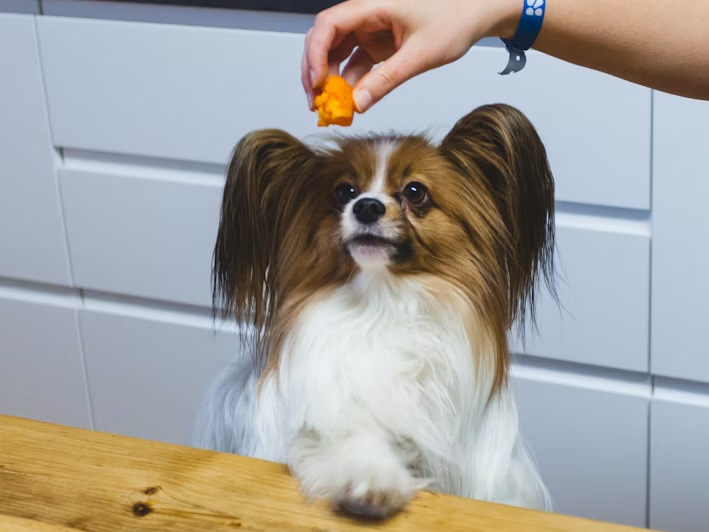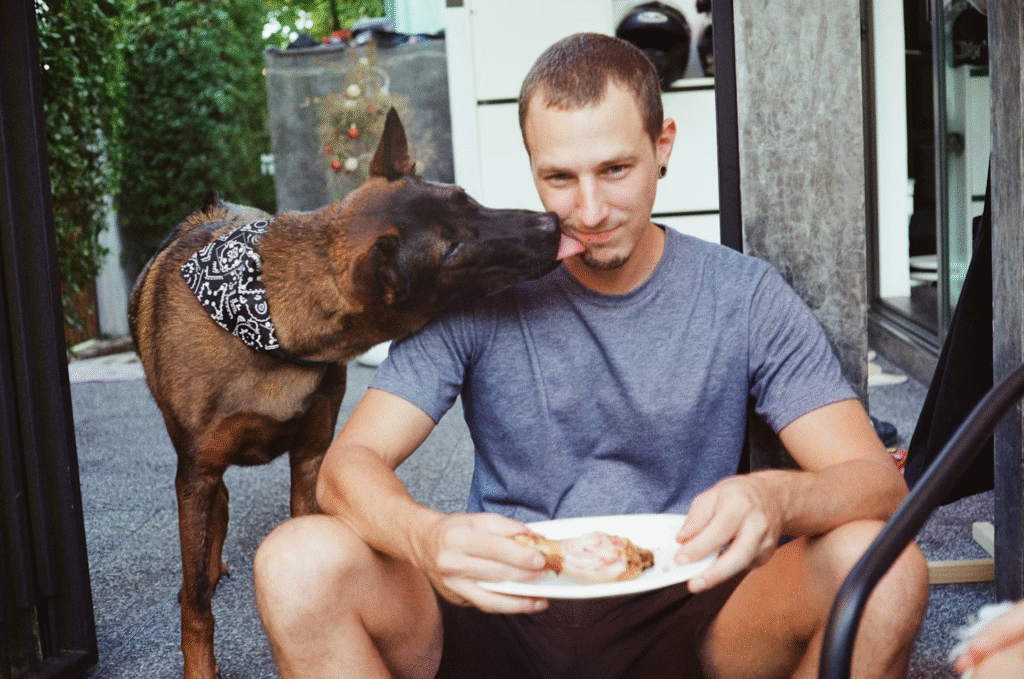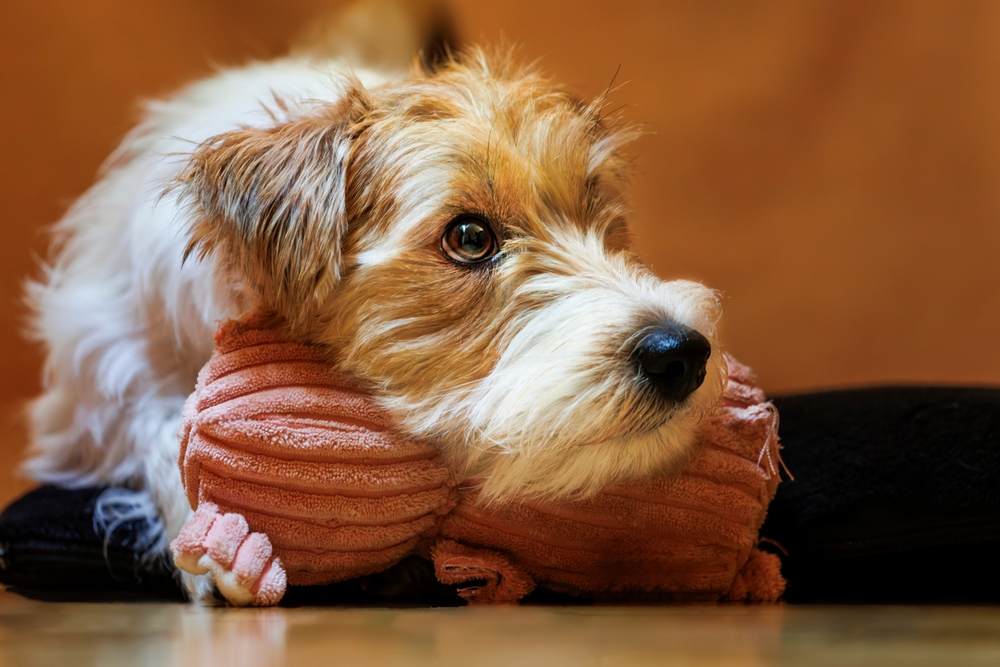When it comes to feeding our furry friends, it is natural to want to share food from our plates. However, dogs have very different digestive systems from humans, and certain foods that are perfectly safe for us can be harmful or even deadly to them. On the other hand, there are some human foods that can be healthy for dogs in moderation. Knowing the difference can help keep your pet safe, happy, and healthy.
5 Things Dogs Should Never Eat

Dogs may beg for whatever is on your plate, but not everything people eat is safe for them. Some foods can upset their stomachs, while others can cause serious health issues. Knowing which items to keep away from your dog’s bowl is key to protecting their well-being.
1. Chocolate

Chocolate is one of the most well-known dangerous foods for dogs, and with good reason. It contains theobromine, a substance that dogs cannot metabolize effectively. Even small amounts of chocolate can lead to symptoms like vomiting, diarrhea, rapid heart rate, restlessness, and in severe cases, seizures or death. Dark chocolate and baking chocolate contain the highest levels of theobromine, making them especially dangerous. It is best to keep all forms of chocolate out of your dog’s reach.
2. Grapes and Raisins

Grapes and raisins may seem like harmless snacks, but they are toxic to dogs. They can cause sudden kidney failure, which can be life-threatening if not treated quickly. The toxic substance in grapes and raisins is still unknown, and not every dog reacts the same way, but the risk is too high to take chances. Even a small amount can be dangerous, so these fruits should always be avoided.
3. Onions and Garlic

Onions and garlic contain compounds that can damage a dog’s red blood cells, leading to a condition called hemolytic anemia. This condition reduces the ability of blood to carry oxygen, which can cause weakness, lethargy, pale gums, and in severe cases, organ failure. Both raw and cooked onions and garlic are unsafe for dogs, as well as powdered forms found in seasoning mixes. Even small amounts consumed regularly can be harmful over time.
4. Xylitol

Xylitol is a sugar substitute commonly found in sugar-free gum, candy, baked goods, and even some peanut butter brands. While it is safe for humans, xylitol is highly toxic to dogs. It causes a rapid release of insulin, which leads to a sudden drop in blood sugar levels. This condition, known as hypoglycemia, can result in weakness, confusion, seizures, and liver failure. Always check ingredient labels carefully before sharing any human food with your dog.
5. Alcohol

Alcohol of any kind is extremely unsafe for dogs. Even small amounts of beer, wine, or liquor can cause intoxication, leading to vomiting, diarrhea, difficulty breathing, coordination problems, and central nervous system depression. In large quantities, alcohol can be fatal. Dogs are far more sensitive to alcohol than humans, so never allow them access to drinks or food items that contain alcohol. Here are 5 Foods That Are Actually Good for Dogs:
1. Carrots

Carrots are a great low-calorie snack for dogs. They are rich in vitamins, particularly vitamin A, and contain fiber that supports digestion. Carrots can also promote dental health since chewing raw carrots helps reduce plaque buildup on teeth. They can be served raw, steamed, or lightly cooked, but avoid seasoning them with butter, salt, or spices.
2. Blueberries

Blueberries are full of antioxidants, which help combat cell damage and support a healthy immune system. They are also a source of fiber and vitamin C, making them a healthy treat for dogs in moderation. Blueberries are bite-sized and low in calories, which makes them perfect for training rewards. Frozen blueberries can also be a refreshing snack on hot days.
3. Pumpkin

Plain, cooked pumpkin or unsweetened canned pumpkin is an excellent food for dogs. It is high in fiber and can help regulate digestion, easing both diarrhea and constipation. Pumpkin also contains important nutrients like vitamin A, potassium, and iron. Just make sure to avoid pumpkin pie filling or any canned pumpkin that contains added sugar or spices, as these are not safe for dogs.
4. Apples

Apples are a nutritious snack that provide dogs with vitamins A and C, along with fiber to support digestive health. They are also low in fat, making them suitable for dogs that need to maintain a healthy weight. Be sure to remove the seeds and core before offering apple slices, as the seeds contain trace amounts of cyanide and the core can pose a choking hazard.
5. Lean Meat

Lean meats such as chicken, turkey, or beef without seasoning are excellent sources of protein for dogs. Protein supports muscle development and energy, which is vital for an active pet. Always cook the meat thoroughly and remove bones, skin, and fat before feeding. Avoid giving dogs processed meats like sausage or deli slices, as these often contain harmful seasonings, preservatives, or high levels of salt.
Finding the Balance

Feeding your dog safely is all about balance and awareness. While it may be tempting to share whatever is on your plate, it is important to remember that dogs process foods differently from humans. Toxic foods can cause serious health issues, but safe human foods like carrots, blueberries, and lean meat can provide valuable nutrients and variety to their diet.
Following Through

When introducing new foods to your dog’s diet, always do so in moderation and watch for any unusual reactions. If you are ever unsure about whether a food is safe for your dog, it is best to consult with your veterinarian first. Follow these guidelines to keep harmful foods out of reach of your pets. Instead, provide them with healthy, safe alternatives and allow your fur babies to live a longer, healthier, and happier life.
Read More: “They Came Back” Heartmelting Moments Of Shelter Dogs Finding Their Forever Homes
Disclaimer: This article was created with AI assistance and edited by a human for accuracy and clarity.

